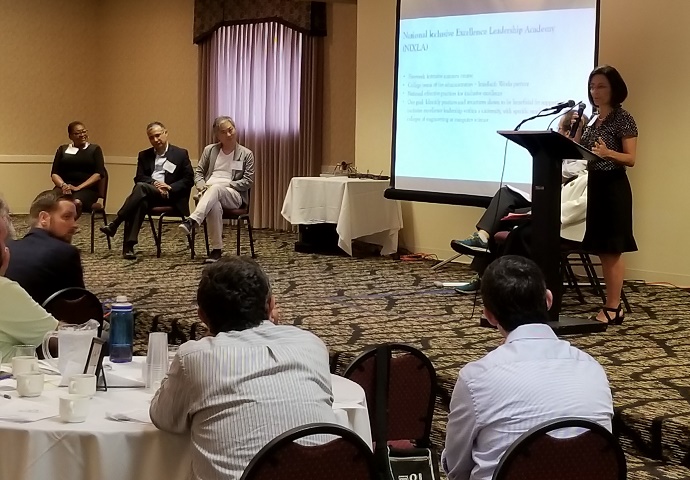Faculty and staff from the College of Engineering and Computer Science participated in the Strategic Diversity Leadership Institute at the college’s annual faculty retreat in August. The intensive day-long workshop followed the completion of National Inclusive Excellence Leadership Academy by key college leaders.

On Aug. 20, Damon Williams, chief catalyst for the Center for Strategic Diversity Leadership & Social Innovation, and Sallye McKee, director of leadership and institutional engagement, facilitated a full day of active-learning for 98 participants, including 87 percent of the college’s full-time faculty, as well as staff members of the Dean’s Leadership Team and the College’s Council for Diversity and Inclusion.
The Association of American Colleges and Universities defines Inclusive Excellence as “designed to help colleges and universities integrate diversity, equity, and educational quality efforts into their missions and institutional operations.” At our retreat, facilitators addressed the what and why of inclusive excellence, and shared effective practices to inform how the college will strive for an integrated approach towards diversity, equity, and excellence. The college will officially launch an Office of Inclusive Excellence over the next two months.
“Our faculty’s engagement in the Institute was extraordinary,” says Dean Teresa Abi-Nader Dahlberg. “I was moved by their discussion, inquiry, and demonstrated commitment to diversity, excellence, equity and inclusion.”
Prior to the faculty retreat, a team that included Dahlberg, Senior Associate Dean Julie Hasenwinkel, Associate Dean for Research and Graduate Programs Gurdip Singh, the David G. Edelstein Professor for Broadening Participation and Department Chair of the EECS Department Jae Oh, Director of Career Services Karen Davis, and Director of the InterFaith Works’ El-Hindi Center for Dialogue Peter Willner joined other higher education leaders in participating in the highly selective, five-week National Excellence Leadership Academy program.
During the academy, participants learned how to be more strategic in not only responding to racism, Islamophobia, and other diversity and inclusion challenges, but also how to develop accountability and incentive-based approaches to expanding diversity and inclusion as a top institutional priority of the entire campus community.“This program is for leaders who really want to strengthen their leadership abilities and truly show commitment at the highest level to use evidence-based approaches to lead change on campus. It’s about providing a tier-one experience for change agents who want to accelerate their personal and institutional trajectories as leaders around issues of diversity, equity, and inclusion,” says Williams.
With leaders from more than 40 top institutions that included large research universities and elite private schools, leadership and strategy development are the twin goals of the program.
“These programs were instrumental for us to develop a plan of action, as we look to accelerate with a new office of inclusive excellence and intergroup dialogue program in the 2018-2019 academic year,” says Dahlberg.
